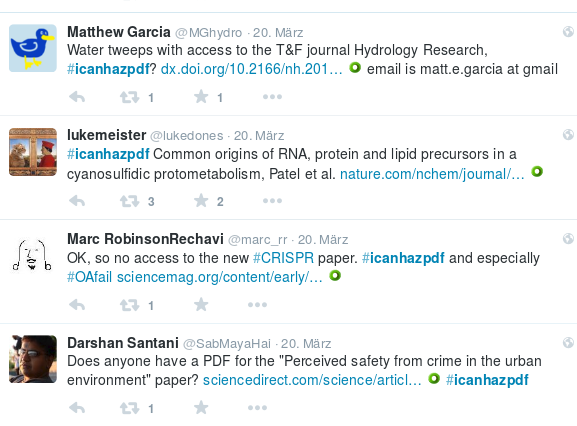Unvorhersehbare Entwicklungen (tphff2015)
MOOCs
- "Ich habe übrigens so einen Online-Kurs. In meiner Klasse waren sage und schreibe 200 000 Studenten eingeschrieben. Am Ende waren es zwar viel weniger. Aber ich hatte trotzdem noch 8000 Studenten, die bei mir die Prüfung abgelegt haben." Robert Shiller in der Frankfurter Allgemeinen Sonntagszeitung 22.3.2015, S.33
ECON 252: FINANCIAL MARKETS (2011) (Open Yale)
How To Improve Robert Shiller’s MOOC
Robert Shiller: Interview über MOOC
Fernleihe und Twitter
Carolyn Cafrey Gardner and Gabriel J. Gardner: Bypassing Interlibrary Loan Via Twitter: An Exploration of #icanhazpdf Requests. [1]
Apart from everyday social use of the micro-blogging service, scholars are clearly using Twitter to increase their professional networks, organize pre-publication review of working papers and manuscript drafts, offer post-publication critique, disseminate published research, and share pre-prints. Twitter is also used to facilitate access to scholarly articles that would otherwise be denied to users behind a paywall or obtained using interlibrary loan. Like peer-to-peer sharing in the music industry, this peer-to-peer access to scholarly material is ethically dubious, and may run afoul of copyright laws, but it is easy to accomplish. The Twitter user simply appends the metadata label, or “hashtag”, #icanhazPDF in the tweet rendering it discoverable through traditional linking and search functions. (S. 95)
...
Librarians who have spoken out about #icanhazPDF have largely decried its existence and reminded patrons of interlibrary loan services. By exploring what is being requested, the authors hope to point out that this is not an isolated phenomenon of a few users and is continuing to grow. Librarians would beneft by being proactive in both preventing the need for the pay-walls and assisting users in becoming aware of how to search for free resources, especially when institutional access ends. Interlibrary loan services experience the same barriers to information access as users, including cost-prohibitive pay per use agreements. Interlibrary loan librarians remind us that one focus on scholarly communication initiatives at universities should be to develop cross-library agreements for interlibrary loan prices so that we are not reliant on publishers for content access.
If these initiatives and agreements fail or receive insuffcient funding, it is likely that librarians will continue to shoulder the burden of providing legal and ethical access to pay-walled content. Preparing students to be life-long information seekers, including accessing scholarly material afer graduation, is an important role for library educators. To better prepare graduating students in particular for what employers are looking for, librarians need to encourage persistence and fexibility in searching as well as equipping our users with the knowledge to find open-access and freely available materials upon graduation. #icanhazPDF is a symptom of a broken scholarly publishing system and of the complexity of many libraries’ interlibrary loan interfaces. The current scholarly publishing system is so broken that some researchers are forced to make requests like “Still looking for a pdf of my own paper! Please help.” Most libraries are unlikely to be able to fulfill requests at the speed of a crowd of Twitter users. Until the system is fixed, or ILL systems are streamlined and given more resources, “guerrilla open access” efforts like #icanhazPDF will persist. (S. 100)
